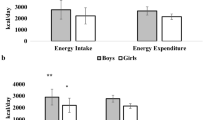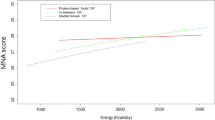Abstract
Objectives: To establish a general view of food habits in Thailand, and to make a quantitative assessment of rice dependency of Thai people.
Design: Cross-sectional study.
Setting: Community.
Subjects: 52 non-smoking and non-habitually drinking adult women in Bangkok participated in the study.
Methods: The participants offered 24 h food duplicates and peripheral blood samples, and underwent clinical examination including anthropometry. The duplicates were subjected to nutritional evaluation taking advantage of the Thai food composition tables (FCTs), and analyzed for eight nutrient elements by inductively coupled plasma mass spectrometry (ICP-MS).
Results: The participants took 1630 kcal from 55 g protein (63% from animal sources), 57 g lipid (mostly from vegetable oil), and 224 g carbohydrate (60% from rice) daily. Nutrient intake at lunch was as large as that at dinner. About a half of the women had insufficient energy intake (ie <80% RDA) whereas 4% had an excess (>120%). Protein intake was sufficient in most cases, whereas lipid intake was in excess in more than a half of the women. Ca, Fe, Mg, Zn and possibly P intakes were below the RDA values in many participants. FCT-based estimates agreed well with the ICP-MS measures in cases of Fe and Ca but tended to be greater than the measures by 50% with regard to P.
Conclusions: Lunch as substantial as dinner for Thai urbanites. There was a marked dependency on rice as an energy source. Whereas protein intake is generally sufficient, the intake of Ca (and to a lesser extent Fe) was insufficient in a majority of the study participants.
Sponsorship: Dai-ichi Mutual Life Insurance, Japan; the Ministry of Health and Welfare, the government of Japan.
European Journal of Clinical Nutrition (2000) 54, 187–194
This is a preview of subscription content, access via your institution
Access options
Subscribe to this journal
Receive 12 print issues and online access
$259.00 per year
only $21.58 per issue
Buy this article
- Purchase on Springer Link
- Instant access to full article PDF
Prices may be subject to local taxes which are calculated during checkout
Similar content being viewed by others
Author information
Authors and Affiliations
Contributions
Guarantor: M Ikeda
Contributors: M Ikeda designed the study and drafted the paper. S Srianujata, O Banjong and C Chitchumroonchokchai took full responsibility for sample collection. N Matsuda-Inoguchi made nutritional analysis and evaluation with support of H Nakatsuka. Z-W Zhang and T Watanabe analyzed materials for elements. S Shimbo was responsible for clinical evaluation. K Higashikawa made statistical analysis including table preparation. Most of the contributors worked together in the field survey, and all of them reviewed the paper.
Rights and permissions
About this article
Cite this article
Matsuda-Inoguchi, N., Shimbo, S., Zhang, ZW. et al. Nutrient intake of working women in Bangkok, Thailand, as studied by total food duplicate method. Eur J Clin Nutr 54, 187–194 (2000). https://doi.org/10.1038/sj.ejcn.1600917
Received:
Revised:
Accepted:
Published:
Issue Date:
DOI: https://doi.org/10.1038/sj.ejcn.1600917
Keywords
This article is cited by
-
Prevalence of neural tube defect in southern Thailand: a population-based survey during 2009–2012
Child's Nervous System (2014)
-
Gender Difference in Accumulation of Calcium and Phosphorus in the Left Coronary Arteries of Thais
Biological Trace Element Research (2011)



